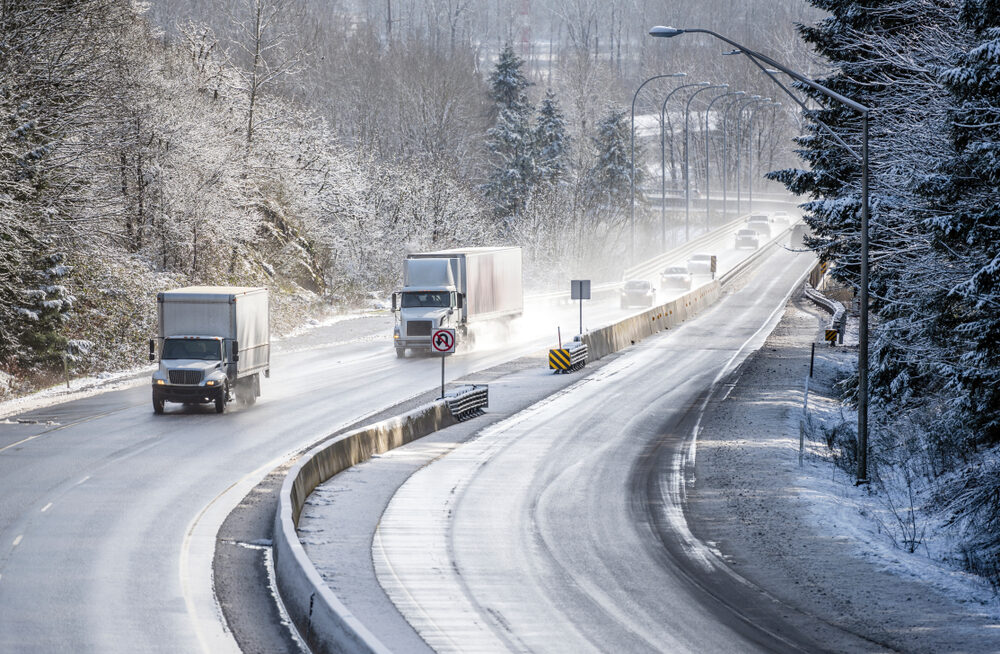
Commercial routes consistently take large trucks through West Virginia, home to breathtaking mountains and valleys that awe tourists and locals alike. But roads and highways must be built around the natural beauty here in the mountain state, which makes truck driving especially difficult and dangerous; narrow, winding roads, steep hills, and sharp turns require drivers to be focused, alert, and constantly following safe driving practices.
When winter weather is added to the equation, there are increased risks of serious and catastrophic trucking accidents. Snow, rain, wind, fog, and other weather events create treacherous conditions for everyone on the road, even more so for large trucks. Winter weather in West Virginia can lead to trucking accident injuries that take weeks, months, or longer to recover from, and in some cases, they’re fatal.
Trucks weigh far more than cars, SUVs, and other vehicles, not to mention they’re much larger, longer, and top heavy. Because of this, truck accident injuries and fatalities are usually suffered by drivers and passengers in other vehicles.
Truck drivers should make many adjustments to lower the risk of crashes in the winter. While some accidents are truly accidents, in some cases, negligent truck drivers cause accidents during poor weather conditions.
Types of Winter Weather that Causes Trucking Accidents
Driver negligence is the most common cause of truck accidents. For example, these large commercial vehicles require much more stopping distance than cars – about 20 to 40 percent more. A truck driver who tailgates instead of leaving a safe distance, as all drivers must do, would be negligent if they crashed into the car in front of them because there wasn’t enough room to safely adjust their speed or stop.
Many types of winter weather can lead to truck accidents in West Virginia, including:
- Rain
- Snow
- Fog
- Wind
- Sleet
- Freezing rain
With so many ways that winter weather can make the roads dangerous, drivers need to be aware of their rights. They should also know the steps to take after a West Virginia trucking accident, and once immediate measures are taken, contact an attorney.
How Rain and Snow Causes Truck Accidents
To understand how winter weather can lead to trucking accidents, we need to examine the impact of specific events, like precipitation. Certain areas of West Virginia see a lot of precipitation each year.
Rain and snow have similar effects on commercial trucks and those who drive them. It decreases visibility, making it difficult to see the road, upcoming turns, other vehicles, and to judge distance. But rain and snow also make the road slippery. Heavy trucks already need more distance to stop, and a slippery road only increases the space the driver needs to drive safely and adjust to changing traffic patterns during adverse weather events. When they don’t drive responsibly, a trucking accident can occur.
Lane obstruction can also occur during precipitation. Snow drifts and slush can make lanes difficult to navigate, and changing lanes can cause drivers to lose control because their tires struggle to maintain traction. Heavy rain can cause flooding, increasing the risk of hydroplaning, and if that happens to a truck, the crash can be catastrophic.
How Fog Causes Trucking Accidents
The effect that West Virginia’s mountains, valleys, and rivers have on the weather in the state makes it a prime location for frequent fog. While common year-round, fog happens more often in fall and winter.
According to the Transportation Research Board, fog causes 1.3% of all fatal accidents in West Virginia. It decreases visibility, causes distorted perception, and drivers tend to leave less space between other vehicles, leading to trucking accidents.
The reduced visibility that fog causes makes it difficult to see the road, vehicles, and upcoming turns. It creates extremely hazardous conditions for truck drivers, who need significant time to stop.
How Wind Can Lead to Trucking Accidents
There are many types of weather events that impact roads. When it comes to wind, traffic speed and longer travel times can create risks on the road; how far a truck driver can see is reduced when the wind blows snow in winter, and it can cause lanes to be obstructed with snow drifts, increasing dangers. Debris can also be blown onto roads, and if hit, an accident with several vehicles can occur.
Commercial trucks carry a lot of weight and are top-heavy, and high winds in the winter significantly affect the truck itself. Wind can cause trucks to sway into other lanes or be pushed across a median, which can cause severe injuries to anyone in its path. Wind can make trucks unstable and make it difficult for drivers to control their cargo. And if it’s not loaded correctly or a truck isn’t regularly maintained, there’s a greater risk of disaster.
It’s known that roads are safer when all vehicles on the road keep a safe distance from others, passing is done safely, and drivers stay alert. With the windy winter days in West Virginia, knowing the impact adverse weather has on large trucks could save your life.
How Sleet Can Lead to Truck Accidents
With winter temperatures that hover around the freezing mark in many areas of West Virginia, sleet and freezing rain occur every season. Like rain and snow, sleet can reduce visibility but also cause the road’s surface to freeze, making it extremely slippery. Braking also becomes more difficult for trucks and others on the road.
When trucks start sliding, drivers have little to no control over where they go, and other cars may be unable to get out of the way due to the slippery surface. This is how sleet in winter can lead to trucking accidents.
While freezing rain is similar to sleet in that it coats roads with ice, it can snap trees and branches, too. If it’s windy, this debris may be blown onto the icy road, creating additional winter driving hazards.
Since West Virginia’s roads and highways have many steep hills and sharp turns, icy roads can lead to sudden truck crashes, especially if drivers are negligent. After all, it takes longer to slow down during freezing rain and sleet, and turning too quickly can affect traction, so drivers must travel with caution.
Why You Need a Truck Accident Attorney
According to the Federal Motor Carrier Safety Administration, rain, snow, freezing rain, severe crosswinds, blowing snow, sleet, or hail caused nearly 500 fatal truck crashes in the U.S. in 2020. This adverse weather also led to 14,000 injuries. In addition, there were 68 fatalities and 1,000 injuries from truck accidents when there was fog, smoke, or smog.
It’s clear that weather conditions affect everyone on the road, but when a truck driver is also negligent during adverse winter weather, the risk of a trucking accident increases – and the result can be life changing. Crashes involving large trucks can cause serious injuries, including broken bones, traumatic brain injuries (TBIs), spinal cord injuries, loss of limb, organ damage, and extensive emotional trauma.
Truck accident injuries are costly for the victim. Lost wages, surgeries, hospital stays, rehabilitation, future medical costs, and other damages quickly add up. Without proper legal representation, the long-term effects of a crash can be devastating.
If you or a loved one was injured in a truck accident, hiring a West Virginia trucking accident attorney is important. Regardless of the weather, you’re entitled to recover compensation if you weren’t liable and suffered injuries or lost a loved one due to a negligent driver, unbalanced cargo, or an improperly maintained commercial vehicle.
The truck accident attorneys at Paulson & Nace have been fighting for the rights of victims injured in trucking accidents and surviving families in wrongful death claims. Contact us online or at 1-202-463-1999 for a free, no-obligation consultation.

With the law firm of Paulson & Nace, Mathew Nace's practice areas include medical malpractice, trucking litigation, auto collision, premises liability, wrongful death and other catestrophic negligence and personal injury matters. He is licensed to practice in Maryland, West Virginia, and the District of Columbia.










Comments for this article are closed.